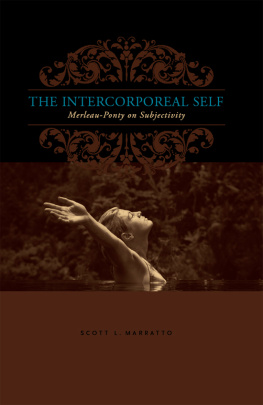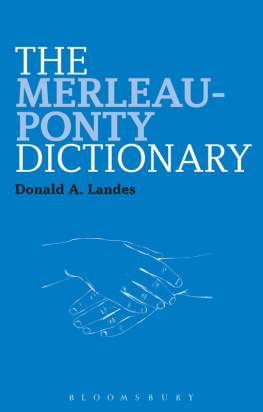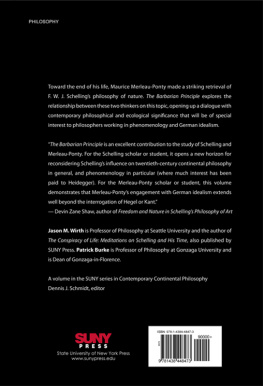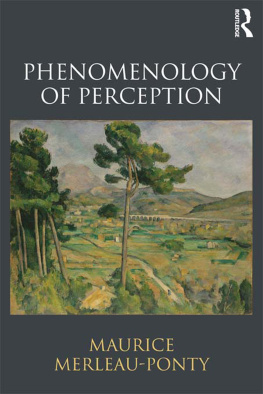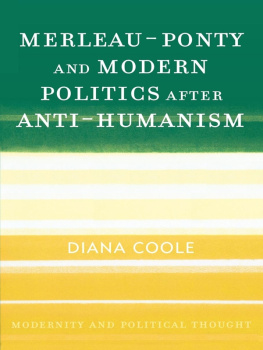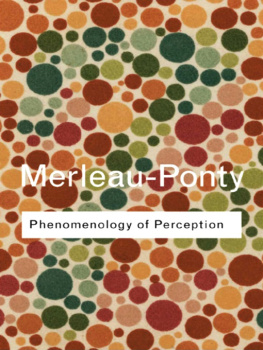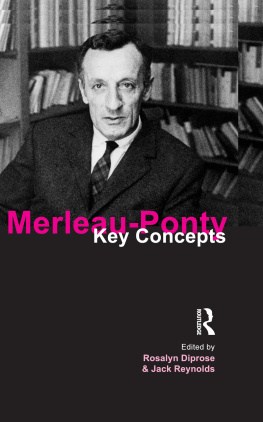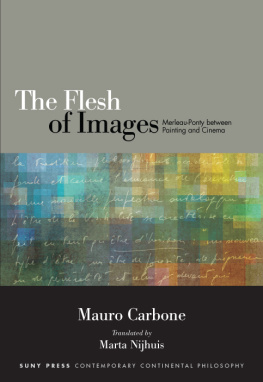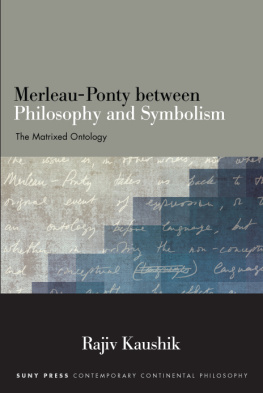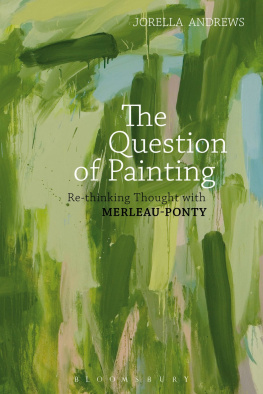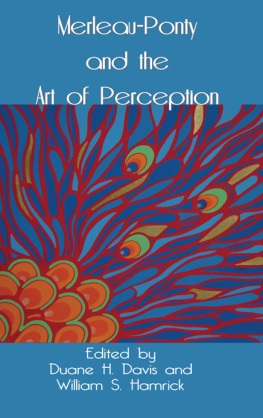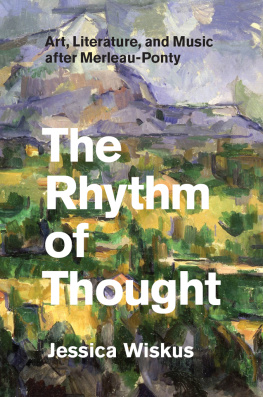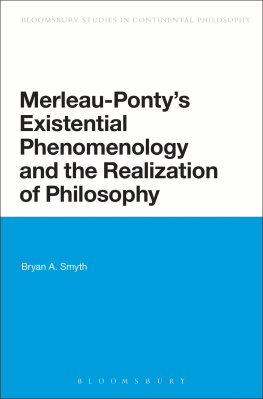THE INTERCORPOREAL SELF
Merleau-Ponty on Subjectivity
SCOTT L. MARRATTO
STATE UNIVERSITY OF NEW YORK PRESS
Published by
STATE UNIVERSITY OF NEW YORK PRESS, ALBANY
2012 State University of New York
All rights reserved
Printed in the United States of America
No part of this book may be used or reproduced in any manner whatsoever without written permission. No part of this book may be stored in a retrieval system or transmitted in any form or by any means including electronic, electrostatic, magnetic tape, mechanical, photocopying, recording, or otherwise without the prior permission in writing of the publisher.
For information, contact
State University of New York Press, Albany, NY
www.sunypress.edu
Production, Kelli W. LeRoux
Marketing, Anne M. Valentine
Library of Congress Cataloging-in-Publication Data
Marratto, Scott L. (Scott Louis), 1968
The intercorporeal self : Merleau-Ponty on subjectivity / Scott L. Marratto.
p. cm.
Includes bibliographical references (p. ) and index.
ISBN 978-1-4384-4231-0 (hardcover : alk. paper)
1. Merleau-Ponty, Maurice, 19081961. 2. Subjectivity. I. Title.
B2430.M3764M373 2012
194dc23
2011027049
10 9 8 7 6 5 4 3 2 1
In memory of my mother, Melody McLoughlin
ACKNOWLEDGMENTS

In Phenomenology of Perception, Maurice Merleau-Ponty remarks on the strange manner in which we discover, in a kind of unending process, the patterns of our own thinking only by letting it find its expression in the context of our relations with others. He writes, There is a taking up of others' thought through speech, a reflection in others, an ability to think according to others which enriches our own thoughts (PhP, 179/208). The process of writing a book, which is inevitably a reflection of many conversations, collaborations, helpful comments, criticisms, and suggestions, is particularly exemplary of this philosophical insight.
There are a great many people to whom acknowledgment is due, and any list is sure to be incomplete. I would like to express my particular gratitude to John Russon, who has been an inspiring and challenging teacher, mentor, and friend to me. His comments and reflections on this manuscript have been crucial to its development. I am grateful for John's work as a gifted philosopher and teacher, and also for his efforts in organizing an ongoing philosophical conversation among a group of scholars who have been meeting, for a number of years now, a few days each summer, in Toronto. It has been my privilege to participate in a number of these Toronto Seminars to discuss the works of Merleau-Ponty, Derrida, Hegel, Heidegger, Plato, and Fichte. The list of participants in these conversations over the years includes mer Aygn, Don Beith, Noah Moss Brender, Susan Bredlau, David Ciavatta, Peter Costello, Bruce Gilbert, Jill Gilbert, Shannon Hoff, Kirsten Jacobson, Kym Maclaren, David Morris, Alexandra Morrison, Gregory Recco, and Maria Talero. These conversations have shaped my own approach to the practice of philosophy as well as my interpretation of Merleau-Ponty, and I am grateful to all of them.
My exploration of the relationship between Merleau-Ponty's phenomenology and Derrida's deconstruction, reflected in of this book, began in conversations with Andrew Bailey. His thoughtful approach to my questions and ideas stands, for me, as a model of open-minded philosophical dialogue.
Several people have offered detailed suggestions and comments on versions of the manuscript as a whole. Kirsten Jacobson's very insightful and helpful suggestions motivated and guided my attempts to clarify some key passages. I would also like to express my appreciation for the way in which her work effectively demonstrates the pertinence of Merleau-Ponty's analyses of embodiment and spatiality to a number of issues and debates in contemporary empirical research on child development, gender, mental health, and politics. I am grateful to Leonard Lawlor for his comments and encouragement as well as for his many excellent books and articles on Merleau-Ponty, Husserl, Derrida, and contemporary French philosophy. His work as an interpreter of the continental tradition and as a philosopher has made a deep impression on me, and I can only hope that this is reflected in the pages of this book. I am grateful to Kym Maclaren for her comments, questions, and suggestions on an earlier version of the manuscript as well as for her work as a phenomenologist and scholar of Merleau-Ponty. Her insights on expression, intersubjectivity, self-consciousness, and development have significantly informed my work on these issues. Thanks also to Jeff Mitscherling for his helpful comments on an earlier version of the manuscript.
I would also like to thank Jay Lampert and Graeme Nicholson for their work as extraordinarily gifted teachers and philosophers, as well as for their friendship and encouragement. Lawrence E. Schmidt and Bernard Hammond are two mentors and long-time friends whose approaches to the vocation of teacher and scholar give powerful expression to their abiding concerns for justice and the Good. I am deeply grateful for both of them.
I want to gratefully acknowledge the support of my family, especially my sisters, Laura Ogden and Tracy Fleet.
I acknowledge the Social Sciences and Humanities Research Council of Canada, the Department of Philosophy at the University of Guelph, and the University of King's College in Halifax with gratitude for their support of my research. I would also like to thank Andrew Kenyon and Kelli Williams-LeRoux at SUNY Press for guiding the process of bringing this work to publication.
Lastly, I would like to thank Alexandra Morrison. I am grateful for the joy of her companionship, her support and assistance and, most especially, for a rich philosophical conversation whose various strands weave their way through our daily life together.
LIST OF ABBREVIATIONS

TEXTS BY MERLEAU-PONTY
| EM | Eye and Mind. Translated by Carleton Dallery. In PrP. (L'Oeil et l'Esprit. Paris: Gallimard, 1964.) |
| N | Nature: Course Notes from the Collge de France. Translated by Robert Vallier. Evanston, IL: Northwestern University Press, 2003. (La Nature: notes, cours du Collge de France. tabli et annot par Dominique Sglard. Paris: Seuil, 1995.) |
| PhP | Phenomenology of Perception. Translated by Colin Smith. London: Routledge and Kegan Paul, 1962. (Phnomnologie de la perception. Paris: Gallimard, 1964.) |
| PPOE | In Praise of Philosophy and Other Essays. Translated by John Wild and James M. Edie. Evanston, 1970. (loge de la philosophie. Paris: Gallimard, 1953; and Rsums de cours, Collge de France 19521960. Paris: Gallimard, 1968.) |
| PrP | The Primacy of Perception and Other Essays on Phenomenological Psychology, the Philosophy of Art, History and Politics. J.M. Edie, editor. Evanston, IL: Northwestern University Press, 1964. |
| PW | The Prose of the World. Translated by John O'Neill. Evanston, IL: Northwestern University Press, 1973. ( |

